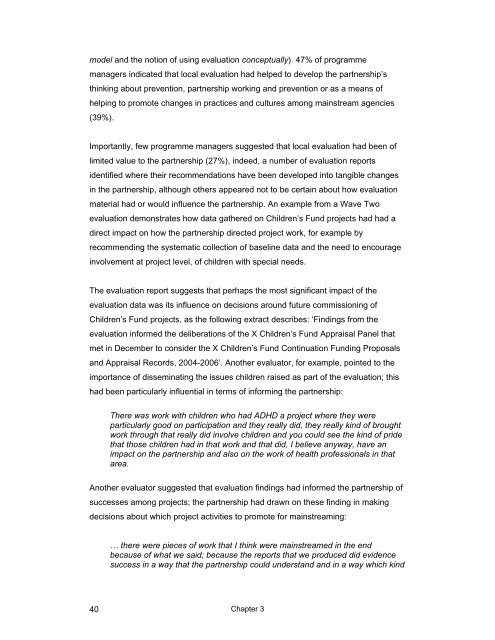Local Evaluation of Children's Services Learning from the Children's ...
Local Evaluation of Children's Services Learning from the Children's ...
Local Evaluation of Children's Services Learning from the Children's ...
- No tags were found...
You also want an ePaper? Increase the reach of your titles
YUMPU automatically turns print PDFs into web optimized ePapers that Google loves.
model and <strong>the</strong> notion <strong>of</strong> using evaluation conceptually). 47% <strong>of</strong> programmemanagers indicated that local evaluation had helped to develop <strong>the</strong> partnership’sthinking about prevention, partnership working and prevention or as a means <strong>of</strong>helping to promote changes in practices and cultures among mainstream agencies(39%).Importantly, few programme managers suggested that local evaluation had been <strong>of</strong>limited value to <strong>the</strong> partnership (27%), indeed, a number <strong>of</strong> evaluation reportsidentified where <strong>the</strong>ir recommendations have been developed into tangible changesin <strong>the</strong> partnership, although o<strong>the</strong>rs appeared not to be certain about how evaluationmaterial had or would influence <strong>the</strong> partnership. An example <strong>from</strong> a Wave Twoevaluation demonstrates how data ga<strong>the</strong>red on Children’s Fund projects had had adirect impact on how <strong>the</strong> partnership directed project work, for example byrecommending <strong>the</strong> systematic collection <strong>of</strong> baseline data and <strong>the</strong> need to encourageinvolvement at project level, <strong>of</strong> children with special needs.The evaluation report suggests that perhaps <strong>the</strong> most significant impact <strong>of</strong> <strong>the</strong>evaluation data was its influence on decisions around future commissioning <strong>of</strong>Children’s Fund projects, as <strong>the</strong> following extract describes: ‘Findings <strong>from</strong> <strong>the</strong>evaluation informed <strong>the</strong> deliberations <strong>of</strong> <strong>the</strong> X Children’s Fund Appraisal Panel thatmet in December to consider <strong>the</strong> X Children’s Fund Continuation Funding Proposalsand Appraisal Records, 2004-2006’. Ano<strong>the</strong>r evaluator, for example, pointed to <strong>the</strong>importance <strong>of</strong> disseminating <strong>the</strong> issues children raised as part <strong>of</strong> <strong>the</strong> evaluation; thishad been particularly influential in terms <strong>of</strong> informing <strong>the</strong> partnership:There was work with children who had ADHD a project where <strong>the</strong>y wereparticularly good on participation and <strong>the</strong>y really did, <strong>the</strong>y really kind <strong>of</strong> broughtwork through that really did involve children and you could see <strong>the</strong> kind <strong>of</strong> pridethat those children had in that work and that did, I believe anyway, have animpact on <strong>the</strong> partnership and also on <strong>the</strong> work <strong>of</strong> health pr<strong>of</strong>essionals in thatarea.Ano<strong>the</strong>r evaluator suggested that evaluation findings had informed <strong>the</strong> partnership <strong>of</strong>successes among projects; <strong>the</strong> partnership had drawn on <strong>the</strong>se finding in makingdecisions about which project activities to promote for mainstreaming:… <strong>the</strong>re were pieces <strong>of</strong> work that I think were mainstreamed in <strong>the</strong> endbecause <strong>of</strong> what we said; because <strong>the</strong> reports that we produced did evidencesuccess in a way that <strong>the</strong> partnership could understand and in a way which kind40Chapter 3
















